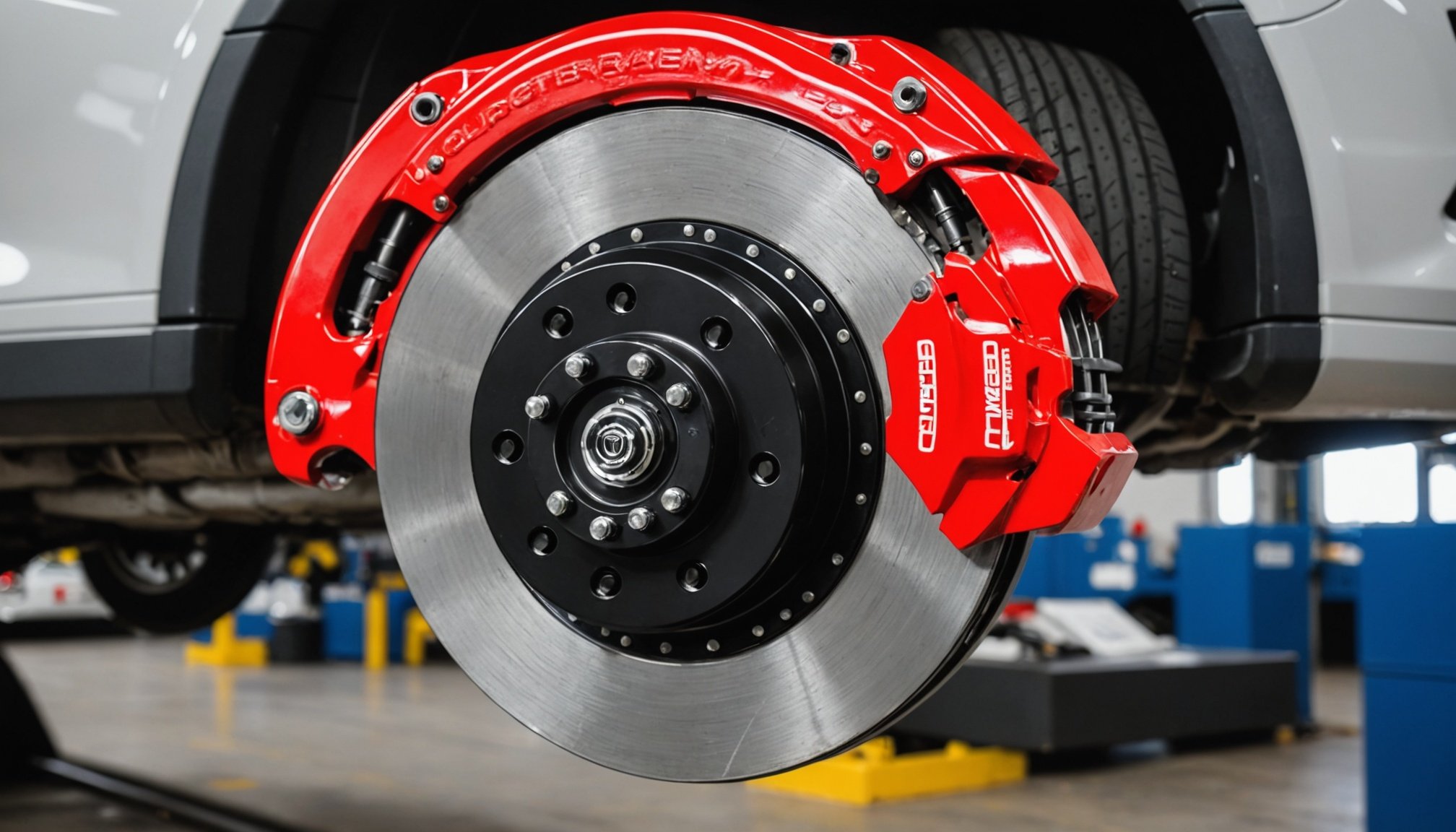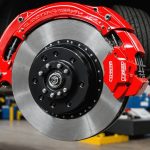Upgraded brake calipers can significantly enhance your vehicle's emergency stopping power. Beyond aesthetics, these components play a vital role in brake performance, especially during crisis situations. Increased heat dissipation, improved pedal feel, and more consistent stopping can be game-changers on the road. Understanding their impact is essential for anyone considering performance upgrades. Discover whether investing in these high-performance brake calipers is worthwhile for your driving experience and safety.
Understanding Brake Calipers
Brake calipers play a crucial role in the braking system, acting as the mechanism that applies pressure to the brake pads. These pads then press against the rotors, creating the friction necessary to slow down or stop a vehicle. The function of brake calipers is essential for effective braking performance and safety.
This might interest you : Essential Wheel Bearing Care: Safeguarding Commercial Trucks from Accidents
There are two main types of brake calipers: fixed and floating. Fixed calipers have pistons on both sides of the rotor, providing a more even pressure distribution. This design generally results in better performance, especially in high-speed or high-performance vehicles. However, they are typically more expensive and complex to maintain.
On the other hand, floating calipers have pistons on only one side, with the caliper moving slightly to create the necessary pressure on the rotor. While they may not offer the same level of performance as fixed calipers, they are more cost-effective and easier to maintain.
Have you seen this : How can I recognize and avoid dangerous driving behaviors in others?
The interaction between brake calipers, pads, and rotors is vital. The caliper houses the brake pads and, when activated, pushes them against the rotor. This interaction converts kinetic energy into thermal energy, effectively slowing the vehicle. Understanding these components can help in making informed decisions regarding vehicle maintenance and performance.
Impact of Upgraded Brake Calipers on Performance
Upgraded brake calipers significantly enhance braking performance by applying greater force and improving overall efficiency. Larger pistons in upgraded calipers generate more pressure on the brake pads, increasing the friction against the rotor. This enhancement leads to shorter stopping distances, which is crucial for high-speed or performance vehicles.
These performance upgrades also contribute to better heat dissipation. During intense braking, substantial heat is generated, which can reduce braking efficiency if not managed properly. Upgraded calipers are often designed with improved ventilation and materials that allow for superior heat management, preventing brake fade and ensuring consistent performance.
Moreover, upgraded calipers influence the pedal feel and responsiveness. Drivers often notice a firmer pedal feel, which translates to more immediate and reliable feedback. This responsiveness is particularly beneficial in performance driving scenarios, where precise braking control is essential.
In summary, investing in upgraded brake calipers can lead to substantial improvements in braking performance, offering benefits in force, heat management, and pedal response. These enhancements not only contribute to safety but also provide an enhanced driving experience, especially for those seeking to optimize their vehicle's braking capabilities.
Stock vs. Upgraded Brake Calipers
When considering stock brake calipers versus upgraded options, performance metrics are crucial. Stock calipers are designed for general use, providing adequate braking for everyday driving. However, they may not meet the demands of high-performance scenarios. Upgraded vs stock calipers show a significant difference in stopping power and heat management, essential for drivers seeking enhanced performance.
Performance Metrics
In a performance comparison, upgraded calipers typically offer shorter stopping distances. This is due to larger pistons and better material quality, which increase the friction applied to the rotor. For instance, in high-speed conditions, upgraded calipers can reduce stopping distances by several feet compared to stock options.
Material and Design Differences
Materials play a vital role in caliper performance. Stock calipers are often made from cast iron, which is durable but heavy. Upgraded calipers frequently use aluminum, offering a balance between strength and weight. Aluminum's lighter nature contributes to improved heat dissipation, reducing the risk of brake fade during intense braking.
Weight Considerations
Weight impacts vehicle dynamics significantly. Stock calipers, being heavier, can affect handling and fuel efficiency. Upgraded calipers, with their lighter design, enhance vehicle agility and performance. This weight reduction is particularly beneficial in performance vehicles, where every pound counts.
Real-World Experiences and Testimonials
When exploring brake caliper reviews, drivers often share insightful user testimonials that highlight the tangible benefits of upgraded calipers. These personal accounts underscore the enhanced performance feedback experienced by many.
Drivers frequently report a noticeable improvement in stopping power and control. For instance, one user noted their vehicle's ability to halt more swiftly and smoothly, particularly in emergency situations. This feedback is common among those who have transitioned from stock to upgraded calipers, emphasizing the enhanced safety and confidence it provides.
In terms of performance feedback, upgraded calipers are praised for their ability to handle intense braking conditions without fading. A sports car enthusiast shared how their upgraded calipers maintained consistent performance during track days, where heat management is crucial. This aligns with the general consensus that upgraded calipers offer superior heat dissipation.
Case studies further illustrate the impact across different vehicle types. For example, an SUV owner highlighted the improved handling and reduced brake fade during off-road adventures. Meanwhile, a sedan owner appreciated the firmer pedal feel, which contributed to a more engaging driving experience. These testimonials collectively affirm the value of investing in upgraded brake calipers for diverse driving needs.
Cost Analysis and Installation Considerations
When evaluating brake caliper costs, it's essential to consider both parts and labor. Upgraded calipers typically range from a few hundred to over a thousand dollars, depending on the brand and specifications. Labour costs vary significantly, with professional installations often adding several hundred dollars to the total expense.
For those considering a DIY approach, there are several installation tips to keep in mind. First, ensure you have the necessary tools, such as a jack, lug wrench, and torque wrench. Carefully follow the manufacturer's instructions to avoid potential mishaps. Enthusiasts often find satisfaction in performing their own installations, but it's crucial to have a solid understanding of the braking system to ensure safety and effectiveness.
However, professional installation is recommended for those less experienced. Professionals not only guarantee proper installation but also offer warranties for their work. To manage budget considerations, consider sourcing parts independently and seeking quotes from multiple service providers. Some shops may offer discounts if you provide your own components.
Ultimately, balancing brake caliper costs with quality installation ensures optimal performance and safety. Whether opting for DIY or professional services, thorough research and planning can lead to successful upgrades.
Safety Benefits and Regulatory Considerations
Upgraded brake calipers offer significant safety improvements by enhancing brake safety. They apply greater force, resulting in shorter stopping distances and better control, especially in emergency situations. This improvement is crucial for maintaining vehicle safety in high-speed or challenging driving conditions.
Understanding the regulatory landscape is essential when upgrading calipers. Automotive safety regulations often mandate specific standards for braking systems to ensure driver and passenger safety. These regulations can vary by region but generally focus on performance metrics and brake safety features. Compliance with these standards is crucial to avoid penalties and ensure the upgraded components meet safety requirements.
When considering upgraded calipers, it's also important to evaluate the impact on vehicle insurance and liability. Insurance companies may offer reduced premiums for vehicles equipped with enhanced safety features, such as high-performance brake systems. However, failure to comply with safety regulations or improper installation can lead to liability issues in the event of an accident.
In summary, while upgraded calipers contribute to improved vehicle safety, it's vital to adhere to automotive regulations and consider insurance implications to fully benefit from these safety enhancements.
Recommendations for Specific Vehicles and Setups
Choosing the right brake caliper recommendations for your vehicle can significantly enhance performance. When considering vehicle-specific upgrades, it's essential to tailor your selection to your driving style and conditions. For instance, sports cars benefit from high-performance calipers designed for speed and agility, while SUVs may require calipers that offer robust off-road capabilities.
Performance tuning is crucial for achieving optimal braking efficiency. If you frequently drive in urban areas, consider calipers that enhance stop-and-go performance. Conversely, those who enjoy track days might opt for calipers with superior heat dissipation and shorter stopping distances.
Finding the right resources is vital for ensuring compatibility and quality. Trusted suppliers often provide detailed specifications and compatibility charts, assisting in selecting the correct calipers for your vehicle model. It's also beneficial to consult forums and reviews from other drivers who have undertaken similar upgrades. These insights can guide you towards reliable vehicle-specific upgrades and ensure you get the best value for your investment.
In summary, selecting the right brake calipers involves understanding your vehicle's needs and sourcing from reputable suppliers. Tailoring your choice enhances both safety and driving enjoyment.











